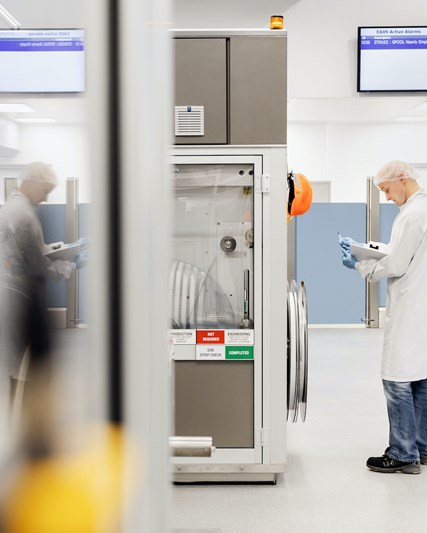Issued: London, UK
For media and investors only
GSK’s RSV vaccine, Arexvy, accepted for regulatory review by the European Medicines Agency for the prevention of RSV disease in adults aged 50-59 at increased risk
- Application supported by positive results of a Phase III study showing immune response and acceptable tolerability profile in this population
- Adults aged 50 and above with underlying medical conditions are at increased risk for RSV disease1,2,3
- GSK is the first company to file for regulatory approval to extend RSV vaccination to adults aged 50-59 at increased risk
GSK plc (LSE/NYSE: GSK) today announced that the European Medicines Agency (EMA) has accepted the company’s regulatory application to expand the use of its adjuvanted recombinant respiratory syncytial virus (RSV) vaccine to adults aged 50-59 who are at increased risk for RSV disease. If accepted, GSK’s RSV vaccine would be the first vaccine available to help protect this population. Arexvy is currently approved in Europe in adults aged 60 and over for the prevention of lower respiratory tract disease (LRTD) caused by RSV.
This regulatory submission follows the positive results from a phase III trial [NCT05590403]4 evaluating the immune response and safety of GSK’s RSV vaccine in adults aged 50-59, including those at increased risk for RSV-LRTD due to underlying medical conditions.
The burden of RSV disease in adults is likely to be underestimated due to lack of awareness, lack of standardised testing, and under-detection in surveillance studies5. People with underlying medical conditions, such as chronic obstructive pulmonary disease (COPD), asthma, chronic heart failure6 and diabetes7 are at increased risk for RSV disease. RSV can exacerbate these conditions and lead to pneumonia, hospitalisation, or death8. The burden in adults aged 50-59 and at increased risk for RSV disease is similar to that of 60 and above9.
GSK is the first company to file for regulatory approval to extend RSV vaccination to help protect adults aged 50 to 59 at increased risk for RSV disease due to underlying medical conditions. A European regulatory decision is anticipated in H2 2024.
About GSK’s RSV vaccine
Respiratory syncytial virus vaccine, adjuvanted, contains recombinant glycoprotein F stabilised in the prefusion conformation (RSVPreF3). This antigen is combined with GSK’s proprietary AS01E adjuvant.
The European Medicines Agency has approved GSK’s RSV vaccine for the prevention of lower respiratory tract disease (LRTD) caused by respiratory syncytial virus (RSV) in individuals 60 years of age and older. The use of this vaccine should be in accordance with official recommendations. As with any vaccine, a protective immune response may not be elicited in all vaccinees.
The vaccine has also been approved for the prevention of lower respiratory tract disease (LRTD) caused by RSV in individuals 60 years of age and older in the US, Japan, UK, Canada and several other countries. Regulatory reviews in multiple countries are ongoing. The proposed trade name remains subject to regulatory approval in other markets.
The GSK proprietary AS01 adjuvant system contains STIMULON QS-21 adjuvant licensed from Antigenics Inc, a wholly owned subsidiary of Agenus Inc. STIMULON is a trademark of SaponiQx Inc., a subsidiary of Agenus.
About the NCT05590403 trial
NCT05590403 is a phase III, placebo-controlled, observer-blind, randomized, multi-country immunogenicity trial to evaluate the non-inferiority of the immune response and evaluate safety in participants aged 50 to 59 at increased risk of RSV-LRTD compared to older adults aged 60 years and above after a single dose of GSK’s RSV vaccine.
The study assessed the immune response in participants aged 50 to 59 with pre-defined stable chronic diseases leading to an increased risk of RSV disease (n=570). Immune responses in a broader group of participants aged 50-59 years without these pre-defined chronic diseases (n=570) were also evaluated compared to adults aged 60 and older. The trial’s primary endpoints were RSV-A and RSV-B neutralisation titres of both groups of 50 to 59 year olds at one month after the vaccine administration compared to adults aged 60 and older. Primary endpoints were met with non-inferior immune responses observed in adults aged 50-59 compared to adults aged 60 and older. There were also safety and immunogenicity secondary and tertiary endpoints.
Results from this trial will be presented at upcoming medical conferences and submitted for peer-reviewed publication. The data are being submitted to other regulators to support potential label expansions.
About RSV in adults
RSV is a common contagious virus affecting the lungs and breathing passages. Adults can be at increased risk for RSV disease due to comorbidities, immune compromised status, or advanced age.8 RSV can exacerbate conditions, including COPD, asthma, and chronic heart failure and can lead to severe outcomes, such as pneumonia, hospitalisation, and death.8 Each year, RSV causes approximately 270,000 hospitalisations and 20,000 in-hospital deaths in adults 60 years of age and older in Europe.5
Please refer to the updated Product Information (PI) for important dosage, administration, and safety information in Europe at this link: http://www.ema.europa.eu/medicines/human//EPAR/arexvy.
About GSK
GSK is a global biopharma company with a purpose to unite science, technology, and talent to get ahead of disease together. Find out more at gsk.com.
Cautionary statement regarding forward-looking statements
GSK cautions investors that any forward-looking statements or projections made by GSK, including those made in this announcement, are subject to risks and uncertainties that may cause actual results to differ materially from those projected. Such factors include, but are not limited to, those described under Item 3.D 'Risk factors' in the company's Annual Report on Form 20-F for 2022, and Q3 Results for 2023.
References
- Malosh RE et al. Respiratory syncytial virus hospitalization in middle-aged and older adults. J Clin Virol. 2017; Nov:96:37-43. doi: 10.1016/j.jcv.2017.09.001
- Prasad N et al. Respiratory Syncytial Virus-Associated Hospitalizations Among Adults With Chronic Medical Conditions. Clin Infect Dis. 2021 Jul 1;73(1):e158-e163. doi: 10.1093/cid/ciaa730.
- Begley KM et al. Prevalence and Clinical Outcomes of Respiratory Syncytial Virus vs Influenza in Adults Hospitalized With Acute Respiratory Illness From a Prospective Multicenter Study. Clin Infect Dis. 2023 Jun 8;76(11):1980-1988. doi: 10.1093/cid/ciad031.
- ClinicalTrials.gov, A Study on the Immune Response and Safety of a Vaccine Against Respiratory Syncytial Virus Given to Adults 50-59 Years of Age, Including Adults at Increased Risk of Respiratory Syncytial Virus Lower Respiratory Tract Disease, Compared to Older Adults 60 Years of Age and Above 2023. NCT05590403. https://www.clinicaltrials.gov/study/NCT05590403
- Savic M, Penders Y, Shi T, Branche A, Pirçon J-Y. Respiratory syncytial virus disease burden in adults aged 60 years and older in high-income countries: a systematic literature review and meta-analysis, Influenza Other Respir Viruses 2022 2023; 17:e13031
- Falsey, AR et al. Respiratory syncytial virus infection in elderly and high-risk adults, in New Engl J Med 2005; 352:1749-59
- Osei-Yeboah R et al., Respiratory syncytial virus-associated hospitalisation in adults with comorbidities in two European countries, PROMISE investigators, preprint, August 2023
- Centers for Disease Control and Prevention (CDC), RSV in Older Adults and Adults with Chronic Medical Conditions, 2023
- McClure DL et al. Seasonal incidence of medically attended respiratory syncytial virus infection in a community cohort of adults >50 years old. PLoS One 2014; 9(7): e102586.



